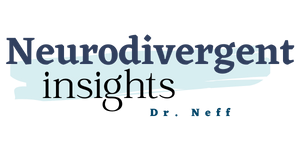Grieving an Autism Diagnosis: Reflections of an Autistic Clinician
Reflections on grieving Autism diagnosis
I am a neurodivergent affirming therapist and assessor. What this means is that I unapologetically affirm neurodivergent identities. I see these as parts of identity to be embraced, celebrated, and integrated into one’s self-concept. My own diagnosis has been one of the most liberating experiences of my life. I love my autistic-ADHD self: my passion and energy that comes from my unquenchable thirst to know every detail pertaining to my special interests, my honest genuine mode of being, and my creative playfulness. I appreciate the way my body and soul alert me to inauthenticity and drive me toward authentic encounters. There is much to celebrate. I would not trade neurotypes if I could.
AND I also grieve.
Grieving the Limits
I grieve the limits of my body. The way my body becomes overwhelmed, numbs out, and dissociates when there are more than three bodies in a room. The fact I often feel as if I am on the outside of my experience looking in. I grieve the way my body easily fatigues, and the limits this places on me and my family. I grieve the ways that intimacy and connection forever teeters on the line of intrusion.
Here’s the thing. It's okay to both celebrate and grieve. Throughout my self-discovery process I have held grief in one hand and joy in the other.
When I walk people through the processes of diagnosis and discovery, it is common for grief and celebration to walk side by side. I have noticed that grief can be the harder of the two for folks to access. I have observed folks feeling apologetic about their grief. They fear accessing their grief means betraying the neurodivergent community. They fear embracing their grief means letting the cultural narratives of autism and ADHD as a “tragedy” prevail.
Accepting all of the Autism
But here’s the risk: the call toward autistic joy and celebration can become its own form of pressure. No one wins when a person feels pulled to deny part of their experience to fit into a community. When I say I am a neurodivergent affirming clinician, it means I am holding space for all of our complex experiences. Affirming spaces are space that welcome the complex, thick narratives. The spaces that can hold and contain a multitude of experiences. Spaces where people are allowed their experience in all of its complexity. We are allowed to both celebrate and grieve. You can celebrate and happy stim dance, you can also lament, cry, and grieve. You can be angry (angry you were missed, angry at the world, angry at the systems that let you down) and liberated. And for the parents, you can celebrate the ability to understand your children better, and you can grieve the extra hardships they will experience as they navigate a world not built for them. Neurodivergence is a complex thing to discover—you deserve spaces that can hold your complex emotions and complex narratives as you integrate this into your identity.
This post was proofread by Grammarly, my go-to for proofreading and catching all the details I naturally miss! Grammarly is entirely free to use. Click here to give it a try.





